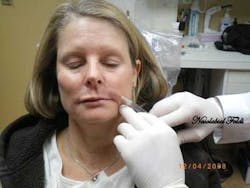Inside Hygiene 31210
Rep. Pat Jones of Maine (far right) leads a tour of schoolchildren at the state legislature.
Over the years, RDH magazine has featured dental hygienists who have sought political office — Diann Bomkamp, Virginia Woodward, and JoAnn Gurenlian, among others. Although their campaigns were competitive, the voters in their areas elected someone else.So I admit to having a keen interest in the term of office underway (actually, second term) for a Maine dental hygienist. Not only that, legislation introduced by Rep. Patricia Jones that targets the dental hygiene profession is progressing very well in the state’s current legislative session. Rep. Jones, a Democrat from Mount Vernon in the central part of the state, introduced legislation that would include Maine’s independent dental hygienists as practitioners eligible to receive reimbursement from MaineCare. Independent dental hygiene practice has already been established in Maine, so it may strike you that the legislation is merely cleanup work, filling in the chinks of smaller issues that need to be addressed as access-to-care solutions surge forward.Nevertheless, as someone who has followed the political careers of dental hygienists for more than two decades, I am fascinated to see Rep. Jones hard at work in the capital. She recently was kind enough to answer the questions below in an interview.(One final note: Kevin Henry, my colleague on the Dental Economics side, has been following the shortage of dentists in Maine, and posted an article on the subject on DentistryIQ.com. The issues of fewer dentists and independent hygienists are all part of the process in improving access to care in Maine.)RDH eVillage: What is the current activity on the legislation? Is there any projected timetable on when the final legislative vote would occur?Rep. Pat Jones: The bill passed unanimously out of the Health and Human Services committee in February. It will be voted on before the State House and Senate in early March and then be sent to the Appropriations and Financial Affairs Committee with a fiscal note of $52,000. I am working very hard with other legislators to find the funds to get this seed money for Medicaid payments for this service. The cost of these preventative initiatives is small compared with the bill for dental-related emergencies in our hospitals. Maine has a 30% higher rate of emergency room visits than most other states. There are 12,000 MaineCare and uninsured Mainers who go to the emergency room for dental problems each year, at a cost of $6 million. The cost of funding a preventive program pales in comparison to the cost of the proposal. RDH eVillage: What has made the bipartisan spirit of the Committee on Health and Human Services so successful in Maine when any kind of health reform debate elsewhere generally indicates a lack of cooperation?Rep. Pat Jones: The bipartisan cooperation is due to the excellent leadership of our committee chairs and our committee analyst, who foster an inclusive and thoughtful process garnering input from all of our members regardless of political party. We realize we are charged with protecting our most vulnerable citizens, with many of us having a career background in the health field. Unlike many other states and the federal government, Maine has a citizen legislature, which means that most of us have other “day jobs” that help ground us in the importance of good policy rather than partisan politics. RDH eVillage: The attrition of practicing dentists is generally acknowledged within the dental profession, but it’s not well known outside of the profession. Were there any obstacles advocating a need for alternative resources for dental care? Did the state’s dental association, for example, oppose the bill and attempt to keep the status quo in dental care? Rep. Pat Jones: One hundred Maine dentists are expected to retire in the next five years. Each dentist employs about three hygienists — most part-time. When this happens, the public will lose access to 400 dental professionals. Luckily, Maine has passed a law supporting independent practice dental hygiene. Aside from Colorado, Maine is the only state in the nation that empowers hygienists to continue to offer preventive care. Maine has also sanctioned public health dental hygienists, and they work under the general supervision of a dentist. A dentist does not have to be on the premises of the public health setting. Public health dental hygienists work in schools, hospitals, Head Start centers, nursing homes, and correction facilities. Moving toward a mid-level practitioner in Maine and elsewhere has been very difficult and has met much resistance. There are fears that there won't be a high quality of care, or enough work for all. The truth is that there will always be too much work for dental professionals. We must find a more effective and efficient system to deliver dental services. I have visited other countries, where mid-level practitioners take on a greater role, and they do a much better job of delivering services to more people. Mid-level practitioners can take on the lower level tasks, such as small fillings and simple extractions to allow licensed dentists to do the more complicated treatments such as root canals, surgery, implants, crowns, orthodontics, and more. We need to be reminded of how important our nurse practitioners are to our medical care delivery system. Mid-level dental practitioners would serve a similar function to the dental profession. RDH eVillage: Do you keep in touch with hygienists who have opted to practice independently? How important is it to their financial well-being to receive reimbursement from MaineCare? Do they indicate any difficulties obtaining reimbursement from other carriers?Rep. Pat Jones: I am in touch with independent practice dental hygienists here in Maine. The primary reason the Maine Dental Hygienists’ Association wanted the IPDH passed was to serve the MaineCare (Medicaid) families. We were able to get private insurance coverage passed but not Medicaid payment due to the state budget shortfall. There is a bill in this session to get this funded to cover Medicaid families. IPDHs are getting paid successfully by private insurers. It is mandated.RDH eVillage: On a personal level, may we ask about the reactions of your constituents when they learn that you are a former dental hygienist?Rep. Pat Jones: My constituents know me as a strong advocate for public health programs in general and see maintaining their health and advocating for good public health as very important. I have worked in the Maine Bureau of Health for 25 years in many capacities. I have been a program manager for the state school dental program, and the community health and chronic disease prevention program. I have also worked with the legislature on Maine’s tobacco policies. The speaker of the Maine House of Representative, Hannah Pingree, has assigned me to represent our state at the National Council of State Legislators (NCSL) to work on national health care reform. This was due to my strong background in prevention and health promotion. It isn't just about health care; it’s about health promotion and disease prevention first.More thoughts about the Queen Bees in a dental practice
On Dec. 28, 2009, RDH eVillage published the results of its “Queen Bee” survey. The survey was based on an article about the dominant, bullying personalities that drive us crazy in dental offices. However, 39% of the responses to the survey were posted after Dec. 28. So I thought I would share of the highlights. To refresh your memory (and the 39% of late responses does impact what was published on Dec. 28):• 94% of the respondents claimed to have worked with a Queen Bee, micromanager, or a bully.• By occupation, 39% of the bullies were office managers; 22% were dental hygienists; 16% were dental assistants; 16% were dentists; and the remaining percentage were other dental personnel.• 61% are still working in the office where the bully is entrenched; the others voluntarily left the practice (32%) or were fired (7%). The interesting reading material from the survey was the open-ended questions about readers’ personal experiences/thoughts about the bullies they worked with in an office. The first question was, “If you left on your own accord, please share what was the tipping point or deciding factor?”Here are my favorite responses to the question:• Confidence was completely eroded; he basically broke me. I couldn't take the belittling any more. It was making me crazy so when a colleague retired I jumped at the chance to interview for her position, which I was offered. He got teary-eyed when I left.• An uneducated, unlicensed manager telling me to do four quads of root planing in one hour. All profit, no compassion.• When the "Queen Bee" admitted to the "micromanager" that she had made a mistake in charging out a patient. His answer? "Don't worry about it. I'm sure the assistant gave you the wrong information." And I was standing right there! Anything that was not perfect was blamed on one or another of the assistants.• I decided that my mental and physical well-being was more important than my position in that office. I quit and have never regretted the decision.We also asked, “If you chose to stay (in an office with a micromanager), please share a coping strategy.” Here are some of the more interesting post-Dec. 28th responses:• Not sure if I have found one that really works other than to know that I am one of the stronger and more mature members of the staff. I am stubborn enough not to give the assistant the satisfaction of driving me out of the office. • I try to remember, "She must be a really unhappy person in life."• I let her micromanage and "mother" me because this is her personality style! I know my job and try not to let her get to me!• I had to keep faith that what goes around comes around. I refused to be drawn in by her two-faced tactics and gossip. I bit my tongue quite a bit and tried to make sure the doctor was in earshot to hear any conversations that could create conflict. She often twisted the facts to make others look bad. Once she had made her rounds pointing her finger at each staff member, they all finally realized that she stirred the pot. She had to take an extended leave of absence when a family member got sick. The doctor and office manager realized how pleasant and relaxed the work environment was without her, and, despite the fact that she claimed to do everything, everything was taken care of and she wasn't missed. When it came time for her to return, they explained she was no longer needed.• Just need to take the person’s personality for what it is. Everyone has good ideas and suggestions that are worth consideration. Just because someone has a strong personality doesn't mean that they will get their way. Their ideas and opinions will be considered just as everyone else’s.• Just try to stay above it and continue to blow my own horn. Also, some occasional butt-kissing doesn't hurt either.The last question was, “If you could ‘e-mail’ the Queen Bee, micromanager, bully, or demon one thought, what would it be?” Have a good time. This is the entertaining part.• You are not God.• Your hygiene staff has an education that exceeds the certificate program that was obtained by your assistant many years ago. Not that that assistant's certification does not count for anything, but it does not equate to a four-year college degree in dental hygiene. Your assistant regularly speaks in nasty tones to other staff members and plays childish games because she is mad at somebody in the office, but all you do is avoid confronting her on her behavior. Why in the hell am I still at this office?• You're a pathetic human being.• Retire, witch!• You don't own the practice!• I'm a grown woman, not your teenage child! Go tell someone else what to do NOW and leave me alone!• Get a life and get out of the office so our staff can work in a relaxed atmosphere.• I wouldn't. I understand her own insecurities caused her to seek out faults in others. Nothing I could say could help her overcome this. It would only make me as bad as her.• You need professional help.• Be more human and do consider the others who are forced to work with you; no one is always right.• High-volume/low-quality dental hygiene is not more lucrative, and no, I did not steal paper towels from the office! I just use a lot of paper towels because I wash my hands so much!• I believe that there is always one micromanager, bully, or demon in every office. Dentists do not realize how they are manipulated by these people, so the cycle continues. We had one bully who eventually got caught stealing, so she was fired. Guess what? Now we have another bully in her place.• You have no right to steal another person’s happy, productive work life.• The whole office would thrive without you and be more productive.• GROW UP AND STOP BEING SO MEAN. The initials after your name are RDH, not GOD!Final thoughts about the Chicago Midwinter
Kevin Henry’s coverage of products introduced at the Chicago Midwinter was excellent. I probably would have added mention of Biolase’s new iLase, since its portability and pre-set controls seem ideal for hygienists who would use lasers only for minor procedures.But his last mention in the article deserves a second-the-nomination from me. I actually observed Kevin taking his “nap” under the influence of NuCalm’s relaxation technique at the Hyatt McCormick. He would have looked cool with his dark glasses, except for his mouth hanging open.The hypnotic sensation is supposed to be akin to that feeling you experience just as you’re falling asleep. Solace Solutions representatives said they induced the relaxation technique on about 30 dental professionals attending the annual meeting. The anecdotal information suggests that it is an effective way to relieve anxiety, particularly for longer dental procedures. NuCalm seems to work best when the dental procedure lasts for at least 30 to 40 minutes. Kevin emerged from his “nap” ready to go and feeling very relaxed (he was the guinea pig on a late Friday afternoon with social commitments at the Chicago Midwinter awaiting him).A couple of things that I will wonder about in regard to NuCalm:1 The music piped into the headphones is in contradictory wavelengths, which disrupts the brain’s orientation. Since I’m deaf in one ear, I declined to participate and elected to just watch Kevin. Obviously, I’m not the only hearing-impaired dental patient, so it will be interesting to note how effective the auditory reaction occurs in a broad spectrum of patients.2) Watching Kevin got kind of boring after awhile. After all, he looked like he was just taking a nap. So the ensuing conversations with Solace Solutions personnel were conducted in the hallway outside the hotel room. NuCalm does not induce a deep sleep and patients still retain some level of consciousness. Dental offices can be noisy, even if quieter instruments are being used. So it will be interesting to see how NuCalm works in a noisier environment.Nevertheless, I think Solace Solutions has come up with an innovative method to foster relaxation without the usual chemicals. For more information, check out www.solacesolutions.com.


